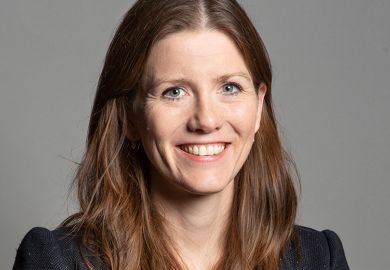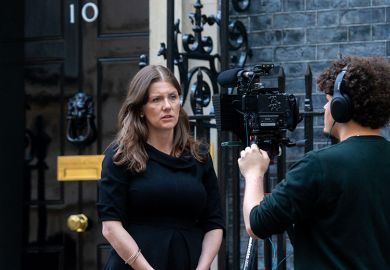The chair of a UK Research and Innovation (UKRI) equality advisory group who was publicly criticised by the science secretary has resigned over the body’s attempts to “appease” the government’s “malevolent attack”.
UKRI found no evidence of wrongdoing by academics on Research England’s expert advisory group on equality, diversity and inclusion who were accused by Michelle Donelan of “extreme views” for social media posts questioning the government’s policy in the Israel-Gaza war.
But Kamna Patel, chair of the panel that was suspended while UKRI – Research England’s parent body – commissioned a lengthy investigation, has now resigned with immediate effect.
In a resignation letter (full text below), Dr Patel, associate professor of development studies at UCL, says she cannot “legitimate the bad decisions of Research England and UKRI – purportedly independent public bodies – to investigate me for ‘extreme views’ on such spurious grounds and on the mere say-so of the secretary of state”.
“Continuing as chair of the EDI expert advisory group would imply that your actions were reasonable, fair and the best option before you; they were not,” she tells Dame Jessica Corner, Research England’s executive chair.
“UKRI chose to launch an external investigation based on a vexatious complaint, where they could not and did not tell me on what evidence they were acting, the specific accusations made against me, or procedurally, share its possible outcomes.”
Ms Donelan had publicly condemned the “amplification” of a tweet by Dr Patel, which “condemns violence on both sides but makes reference to Israel’s ‘genocide and apartheid’”, and said she was “outraged” that another member had – as she put it – described the government’s plan to crack down on Hamas support in the UK as “disturbing”.
After a five-month investigation which found no evidence of a breach of the advisory group’s terms of reference, Ms Donelan later agreed to pay £15,000 damages to Kate Sang, professor of gender and employment studies at Heriot-Watt University.
Dr Patel writes in her resignation letter that she has never received an apology over her treatment and that the “absence of any real reflection” on the episode leads her to conclude that Research England “is not serious about equality, diversity or inclusion”.
Instead, she says that changes to the advisory group’s terms of reference and proposed new social media guidance, which will apply to all external advisers, reveal “a primary concern with mollifying politicians and their whims, over what is best for the research community and any rigorous defence of academic freedom”.
The academic warns that publishing the advice of the advisory group, as is also proposed, will “expose the group to so greater political and public scrutiny in a ‘culture war’ climate that I believe it would not only put external advisors in harm’s way, but make it impossible to effectively and meaningfully advise Research England to lead transformative change in the sector”.
Dr Patel concludes by attacking the “disgraceful efforts by the UK government to silence” criticism of what she described as Israel’s genocide against Palestinians.
“Over the past few months, we have seen the playbook of lobbing unfounded allegations and stoking an investigation into anybody critical of the Israeli state’s policies as a sufficient action to malign and silence them, irrespective of any evidence underpinning the charge or the outcome of any investigation. It is to this playbook that you have (been) played,” Dr Patel tells Dame Jessica.
In a statement, Dame Jessica said she understood and respected Dr Patel’s decision and thanked her for her service.
“In responding to the many complex and sensitive issues raised by the secretary of state in her letter, we remained steadfastly focused on outcomes. We took the view that it was essential to follow good governance, supporting robust, principled, evidence-based decisions,” Dame Jessica said, adding that she understood that “some in the research and innovation community would have taken a different approach to the one we followed”.
The independent investigation “has provided a robust foundation from which we can move forward”, she said, and “we will use the feedback from all those concerned to learn what we could do better. I hope that we can work to rebuild trust with those in our communities who have expressed their concerns.”
patrick.jack@timeshighereducation.com
Kamna Patel’s resignation letter to Dame Jessica Corner: full text
Dear Jessica,
It has been an honour to have been trusted to guide and steer Research England’s approach to equality, diversity and inclusion through my appointment as chair of the EDI Expert Advisory Group in June last year. As you know, I have been an external advisor to Research England for several years and saw the formation of this group as an excellent opportunity to continue to build a positive relationship with Research England colleagues and meaningfully support their hard work to try and change the higher education landscape for the better.
However, I cannot remain as Chair and legitimate the bad decisions of Research England and UKRI – purportedly independent public bodies – to investigate me for “extreme views” on such spurious grounds and on the mere say-so of the Secretary of State. Continuing as Chair of the EDI Expert Advisory Group would imply that your actions were reasonable, fair and the best option before you; they were not. UKRI chose to launch an external investigation based on a vexatious complaint, where they could not and did not tell me on what evidence they were acting, the specific accusations made against me, or procedurally, share its possible outcomes. I was therefore invited to submit evidence to an investigation without ever knowing the charges, scope or stakes. At its conclusion, I was offered no apology. I believe you were involved with crafting the “principled process” that guided the external investigation and decision-making around it. Having experienced the investigation, I remain unclear on what those principles were. Clearly, they were not timeliness, transparency, care, or a well-reasoned and fair scope. I must conclude the opaqueness of the principles and the procedures followed is rather their point; enabling maximum flexibility behind closed doors.
Over the past eight months, Research England and UKRI, either separately or in coordinated action, have gone to great lengths to appease the Secretary of State, primarily. Since Research England concluded their investigation and unsuspended the operations of Expert Advisory Group, we have met three times. In the first of these meetings, you informed me of changes planned to the terms of reference for the group. You have never clarified why any change is necessary, given that the findings of the external investigation found there was no case to answer for and your own internal investigation concluded you needed an expert advisory group on EDI. Nonetheless, the changes that you have overseen to the terms of reference for the Expert Advisory Group – alongside UKRI’s proposed new social media guidance that will apply to all external advisors – reveals a primary concern with mollifying politicians and their whims, over what is best for the research community and any rigorous defence of academic freedom and freedom of speech. The most egregious change you propose is that the advice of the Expert Advisory Group is published, a condition made of no other Research England external advisory group or any other EDI group of UKRI. This change would expose the group to so greater political and public scrutiny in a ‘culture war’ climate that I believe it would not only put external advisors in harm’s way, but make it impossible to effectively and meaningfully advise Research England to lead transformative change in the sector, given your proclivity to appeasement.
Both Research England and UKRI’s handling of the Secretary of State’s complaint and events that have followed convey no care or understanding towards external advisors; people you bring into your organisations to help you because you lack the expertise in-house. Across those three meetings, I have repeatedly asked: ‘what is your responsibility to the advisors you appoint?’ and ‘what lessons have you learnt from this series of events?’ There has been no meaningful answer or substantive engagement with either question. The absence of any real reflection leads me to believe that Research England is not serious about equality, diversity or inclusion. I expect that Research England will produce an EDI action plan and implement it as best you can, thus satisfying UKRI’s strategy.
However, the evidence leads me to assess Research England will not embrace or drive the kind of transformative change the sector so desperately needs, and that I once thought was at least on the table or could be put there through my appointment as Chair.
My commitment to EDI work is one of many expressions of my commitment to social and racial justice. I have never hidden this and was explicit in my interview for the role of Chair on how I work with and through Black feminist praxis. You appointed me because of how I express my politics in my practice and its impact. I remain committed to changing the higher education and research landscape so that researchers and scholars at its margins flourish, but will now look elsewhere to enact this.
I’m mindful that in all this what is lost are my original words (misquoted by the Secretary of State), which I said from a deep sense of civic responsibility and rooted in postcolonial scholarship – there is an ongoing genocide and practice of apartheid against Palestinians, a reference to a 76-year project of elimination by the Israeli state, now taking a most deadly turn. Since the Secretary of State’s claim these words constitute “extreme views”, the International Court of Justice concluded genocide of Palestinians in Gaza is a plausible risk, a view supported by renowned scholars of genocide, including Israelis. To this I add, it is emboldened by disgraceful efforts by the UK government to silence all dissent, including those rooted in scholarship and evidence. Over the past few months, we have seen the playbook of lobbing unfounded allegations and stoking an investigation into anybody critical of the Israeli state’s policies as a sufficient action to malign and silence them, irrespective of any evidence underpinning the charge or the outcome of any investigation. It is to this playbook that you have (been) played.
I wish you well, Jessica. And for all our sake, hope the leaders of institutions of knowledge and evidence use both to repel anti-intellectual, malevolent attacks in the future, from wherever they arise, as opposed to indulging them as you and UKRI have chosen to do on this occasion.
Hereby, I am standing down as Chair of the Expert Advisory Group with immediate effect.
With good wishes,
Kamna
POSTSCRIPT:
Print headline: EDI chair quits over Donelan saga
Register to continue
Why register?
- Registration is free and only takes a moment
- Once registered, you can read 3 articles a month
- Sign up for our newsletter
Subscribe
Or subscribe for unlimited access to:
- Unlimited access to news, views, insights & reviews
- Digital editions
- Digital access to THE’s university and college rankings analysis
Already registered or a current subscriber?








